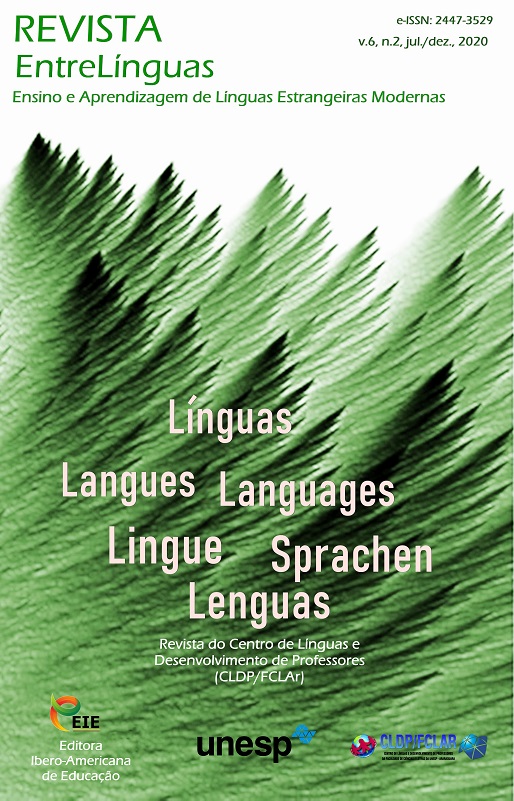Investigation of the effect of online course material on EFL students’ writing ability
DOI:
https://doi.org/10.29051/el.v6i2.13398Keywords:
Online course material, EFL students, Writing ability.Abstract
The paper aimed to investigate the effect of using online course material on EFL students’ writing ability has conducted. The focus of the study is mainly to discover the writing attitudes and learning problems among students. The study employs a methodological triangulation whereby both qualitative and quantitative methods will be used. The study incorporated three stages. First, the foundation survey and the pretest were regulated to all the samples. Next, in the four-week treatment stage, understudies were obliged to do the two errands in class. The main research tools used in the study are the Students’ Survey Questionnaires and the interview questions. 20 English school majors in a rookie composing class took an interest in the study. The significant discoveries show that understudies made noteworthy change in equivalent word use in the controlled tests and still kept up that learning two months after they finished the web learning units. It was concluded from the correlation of the pretest and posttest papers that the students increased their general composition quality and execution in the utilization of synonymous descriptive words. The students had the capacity impel a few examples for the target expressions of 25 equivalent words with different degrees of achievement. By and large, the exactness rate of incitement was more than 50%.
Downloads
References
ADLOO M.; AGHAJANI, M. The effect of online cooperative learning on students’ writing skills and attitudes through Telegram application. International Journal of Instruction, v. 11, n. 3, p. 78-88, 2018.
AHMADI, M. R. The role of using new technologies in learning English as a second/foreign language. International Journal of Research in English Education, Gilan (Irã), v. 3, n. 2, p. 54-77, 2018.
ALSALEEM, B. I. A. The effect of “WhatsApp” electronic dialogue journaling on improving writing vocabulary word choice and voice of EFL undergraduate Saudi Students. 21ST CENTURY ACADEMIC FORUM CONFERENCE, 2014. Proceedings […]. Harvard, 2014. Disponível em: http://www.readwritethink.org/lesson_images/lesson782/Rubric.pdf. Acesso em: 15 mar. 2020.
CAHYONO, B. Y.; MUTIARANINGRUM, I. Indonesian EFL teachers’ familiarity with and opinion on internet-based teaching of writing. English Language Teaching, Canadá, v. 9, n. 1, p. 199-208, 2016.
KRASNOVA, T.; ANANJEV, A. Students’ perception of learning in the online discussion environment. Mediterranean Journal of Social Sciences, Roma (Itália), v. 6, n. 6, S1, p. 202-207, 2015.
LIU, M. Blended learning in a University EFL writing course: Description and Evaluation. Journal of Language Teaching and Research, Finlândia, v. 4, n. 2, p. 301-309. 2013.
MIFTAH, M. Z. Utilization of Edmodo as an online tool in EFL writing class to increase students’ writing ability. Register Journal, Salatiga (Indonésia), v. 11, n. 1, p. 37-58, 2018.
MUSTAQUE, S. Writing problems among the tertiary level students in Bangladesh: a study in chittagong region. Language in India, Índia, v. 14, n. 1, p. 327-391, 2014.
RYBUSHKINA, S.; KRASNOVA, T. Key factors to use blended learning in teaching foreign languages in Russian engineering universities. In: INTERNATIONAL CONFERENCE ON EDUCATION AND NEW LEARNING TECHNOLOGIES, 7., 2015. Proceedings […]. Barcelona: EDULEARN15, 2015. p. 6886-6892.
TANANURAKSAKUL, N. Use of Facebook group as blended learning and learning management system in writing. Teaching English with Technology, v. 14, n. 3, p. 3-15, 2014.
YOUSIF A.; ALSHUMAIMERI, E. M. B. The effects of webquest writing instruction on the writing performance of saudi male EFL Learners. Procedia - Social and Behavioral Sciences, v. 83, p. 960-968, 2013.
Downloads
Published
How to Cite
Issue
Section
License
Os manuscritos aceitos e publicados são de propriedade da Revista EntreLínguas. Os artigos publicados e as referências citadas na Revista EntreLínguas são de inteira responsabilidade de seus autores.
Transferência de direitos autorais – autorização para publicação
Caso o artigo submetido seja aprovado para publicação, já fica acordado que o(s) autor(es) autoriza(m) a UNESP a reproduzi-lo e publicá-lo na EntreLínguas, entendendo-se os termos “reprodução” e “publicação” conforme definição respectivamente dos incisos VI e I do artigo 5° da Lei 9610/98. O artigo poderá ser acessado pela rede mundial de computadores (Internet), sendo permitidas, a título gratuito, a consulta e a reprodução de exemplar do artigo para uso próprio de quem a consulta, desde que haja a citação ao texto consultado. Essa autorização de publicação 328 EntreLínguas, Araraquara, v. 1, n .2, p. 323-328, jul./dez. 2015 não tem limitação de tempo, ficando a UNESP responsável pela manutenção da identificação do(s) autor(es) do artigo. Os artigos publicados e as referências citadas na Revista EntreLínguas são de inteira responsabilidade de seus autores.











